Online Beauty and Personal Care Market Summary, 2032
The global online beauty and personal care market was valued at $54.2 billion in 2022, and is projected to reach $161.4 billion by 2032, growing at a CAGR of 11.7% from 2023 to 2032.The online beauty and personal care market refers to the buying and selling of beauty and personal care products through digital channels such as websites, mobile apps, and social media platforms. This market has grown rapidly in recent years due to the increase in availability and convenience of online shopping.
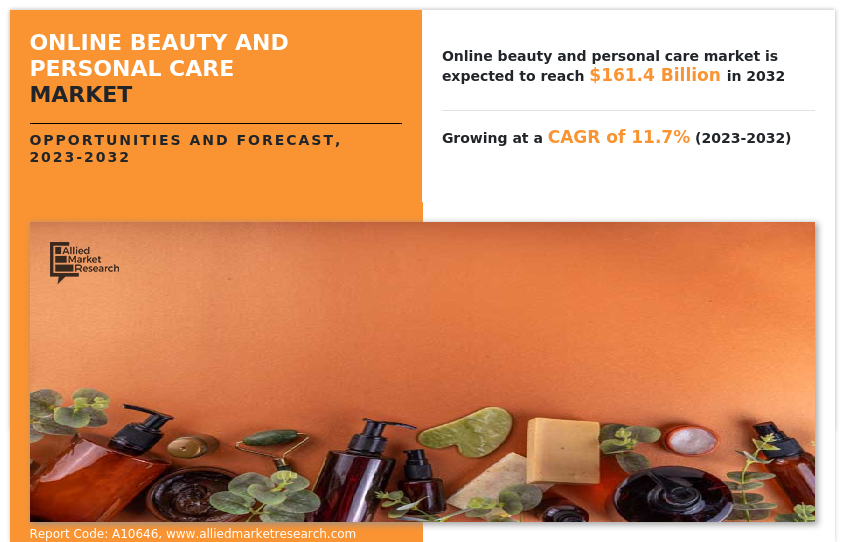
Consumers may browse and purchase a wide range of products, including skincare, haircare, makeup, fragrances, and personal hygiene items from the comfort of their own homes. Many online beauty and personal care retailers offer free delivery, competitive prices, and personalized recommendations based on individual preferences and the purchase histories of customers.
Key Market Trends
Various manufacturers such as Patanjali Ayurved Limited, Dabur, and The Himalaya Drug Company use natural ingredients in beauty and personal care products. This trend caters to an increase in consumer demand for natural or organic beauty and personal care products.
Moreover, an increase in health awareness among consumers is anticipated to contribute to the growth of the beauty and personal care market. However, the recent outbreak of coronavirus has significantly impacted the beauty and personal care industry along with all stages of the supply chain and value chain. It has further affected consumer behavior with regard to purchasing beauty and personal care products globally.
The global beauty and personal care industry has been greatly impacted by the COVID-19 pandemic. The online beauty and personal care market has seen a surge in demand with many countries imposing social distancing measures and lockdowns. Consumers have turned to e-commerce platforms to buy beauty and personal care products because of the convenience and security they provide.
The shift in consumer behavior is one of the most significant effects of the pandemic on the online beauty and personal care market size. Consumers are increasingly turning to online shopping as physical stores close or operate at reduced capacity.
Customer reviews are expected to increase market size because they are an important aspect of the online beauty and personal care market. They provide valuable product feedback and may influence other purchasing decisions of consumers. Reviews may also assist retailers in identifying areas for product and service improvement. One of the most important advantages of customer reviews is that they provide social proof.
Customers are expected to trust a product and make a purchase when they see positive reviews from other customers. Customers may also see how a product performed for others who have similar skin types or beauty concerns, which may help them make a more informed purchasing decision. Moreover, customer feedback provides retailers with useful information.
Retailers identify areas for improvement in their products, services, and customer experience by analyzing customer feedback. Retailers may also use customer reviews to identify trends and popular products, which may help them develop new products and improve their marketing strategies. Retailers frequently offer incentives such as discounts or reward points to encourage customers to leave reviews. Retailers may also prominently display customer reviews on their websites, social media channels, or other marketing materials to highlight the positive feedback they have received.
Furthermore, easy accessibility and a wide range of products in the online beauty and personal care market are expected to drive online beauty and personal care market demand even higher. Customers may easily find and purchase products from online retailers thanks to a variety of features.
Retailers, for example, frequently provide detailed product descriptions, photos, and customer reviews, which may assist customers in making informed purchasing decisions. Retailers may also provide a variety of payment options, such as credit cards, PayPal, or other digital payment methods to make it easier for customers to complete their transactions.
Customers may also get products that are not available in their area because they are easily accessible. Customers who shop online have access to a broader range of products from around the world and may even purchase items that are not available in their local stores. This provides new opportunities for customers to try new products and brands. The availability of mobile commerce is another important aspect of easy accessibility (m-commerce).
Customers may now browse and purchase products on the go, from anywhere, and at any time, due to the increase in use of smartphones and mobile devices. Customers may easily search for products, make purchases, and track their orders using mobile apps and mobile-optimized websites, providing a seamless shopping experience.
However, product delivery inconsistency may be a major issue for the online beauty and personal care market. Customers expect to receive their orders in a timely manner and in good condition when they arrive. It may result in dissatisfied customers and harm the s reputation of the retailer when there are problems with product delivery.
The use of third-party delivery services is one of the major contributors to inconsistent product delivery. Many retailers outsource their shipping and delivery to third-party companies, and these companies may have their own processes and procedures that impact the delivery experience. Delays, lost packages, and damaged products may all have an impact on the customer experience and reduce satisfaction.
Lack of control over the delivery process is another factor that may contribute to inconsistent product delivery. Once the product leaves the warehouse, retailers may lose visibility into the delivery process and may be unable to track the package or provide updates to the customer. This may cause the customer to be frustrated and uncertain, especially if they require the product by a specific date or time.
Retailers may address these issues by improving their delivery processes and customer communication. This may include collaborating with reputable delivery services, providing customers with tracking information, and setting clear expectations for delivery times and conditions. Retailers may also consider offering alternative delivery options, such as same-day or express delivery, to meet the needs of customers who require faster delivery times.
The online beauty and personal care market have been greatly influenced by influencer marketing. Influencers, who are typically well-known social media personalities with large and engaged followings, may help drive sales and raise brand awareness for beauty and personal care products.
One of the primary advantages of influencer marketing is that it allows retailers to reach a highly engaged and specific audience. Influencers typically have a niche or specific area of expertise, which means that the products that the influencer promotes are already of interest to their followers.
Retailers may effectively reach and engage with their target audience by partnering with the right influencers. Influencer marketing may also be a low-cost way to promote beauty and personal care items. Influencer marketing may be more targeted, authentic, and cost-effective than traditional forms of advertising.
Retailers may see a clear return on investment (ROI) for their marketing spend as influencers frequently work on a pay-per-post or commission-based model. Influencer marketing may help to build trust and credibility with consumers in addition to driving sales and increasing brand awareness. Influencers are frequently perceived as authentic and trustworthy information sources, and their recommendations may carry a lot of weight with their followers. Retailers may leverage this trust and credibility by partnering with influencers to build stronger relationships with customers and increase customer loyalty. The aforementioned advantages of influencer marketing are expected to further boost the growth of the online beauty and personal care industry.
Segmental Analysis
The online beauty and personal care market is analyzed on the basis of product category, gender, nature, and region. On the basis of product category, the market is segmented into skin & sun care products, hair care products, deodorants & fragrances, makeup & color cosmetics, and others.
On the basis of gender, the market is categorized into men, women, and unisex. On the basis of nature, the market is bifurcated into organic and conventional. On the basis of region, the market is analyzed across North America, Europe, Asia-Pacific, and LAMEA.
By Type
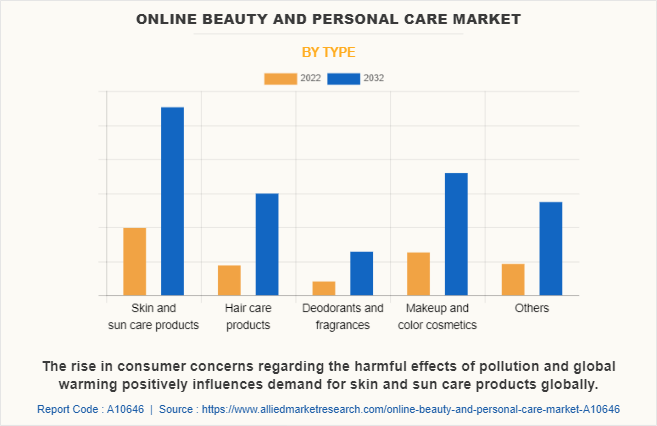
On the basis of type, the online beauty and personal care market is further categorized into skin & sun care products, hair care products, deodorants & fragrances, makeup & color cosmetics, and others. The skincare category is one of the most technically advanced, complex, and diverse categories of cosmetics. Products manufactured by companies have to undergo many dermatological tests before they are introduced for final use in the market. Skincare products play a major role in the daily healthcare regime of individuals.
Moreover, a rise in awareness about natural and organic skin care products is anticipated to fuel the demand for the online beauty and personal care market. In addition, the rise in consumer concerns regarding the harmful effects of pollution and global warming positively influences demand for skin care products globally. A rise in the standard of living in emerging markets and an inclined preference toward beauty are expected to fuel the market further in the future.
By Gender
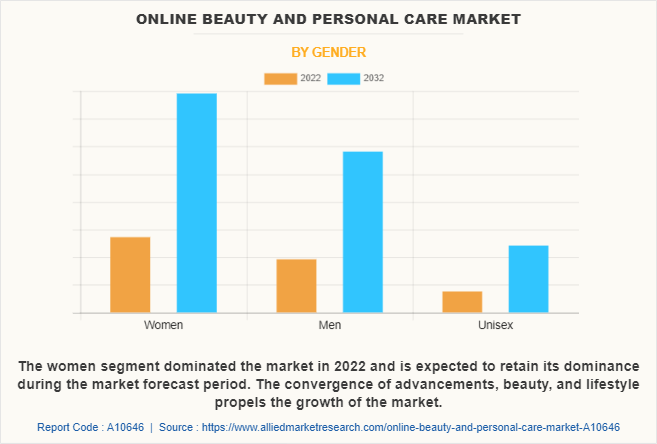
On the basis of gender, the online beauty and personal care market is further bifurcated into men, women, and unisex. The women segment dominated the market in 2022 and is expected to retain its dominance during the market forecast period. The convergence of advancements, beauty, and lifestyle propels the growth of the market. Moreover, the beauty and personal care market across the globe has witnessed continued and sustained growth over the years, owing to the rise in the beauty-conscious female population.
By Nature
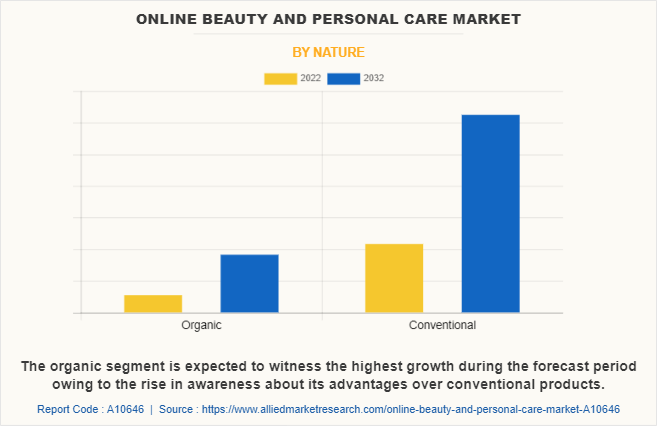
On the basis of nature, the online beauty and personal care market is further bifurcated into organic and conventional. The organic segment is expected to witness the highest growth during the online beauty and personal care market forecast period owing to the rise in awareness about its advantages over conventional products.
Organic products have gained traction in the online beauty and personal care market. These products contain natural and organic ingredients such as plant extracts, essential oils, and botanicals and are free of synthetic chemicals, parabens, and other potentially harmful ingredients. They are frequently regarded as gentler and safer for the skin and the environment.
By Region
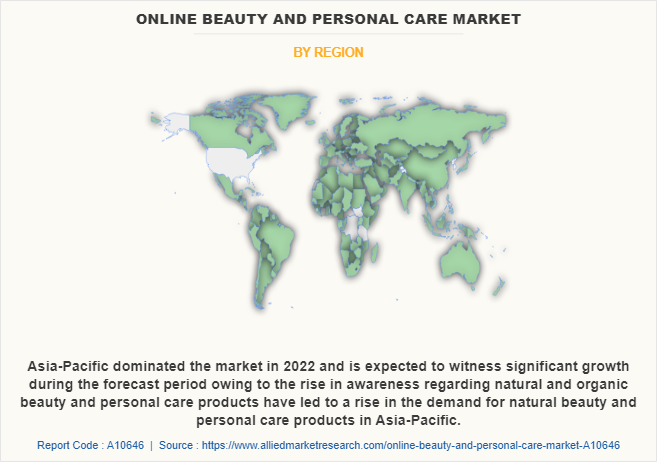
On the basis of region, the online beauty and personal care market is further segmented into North America (the U.S., Canada, and Mexico), Europe (Germany, France, the UK, Italy, Spain, Netherlands, and the Rest of Europe), Asia-Pacific (China, Japan, India, Australia, New Zealand, and the Rest of Asia-Pacific), and LAMEA (Brazil, Argentina, Saudi Arabia, South Africa, and the Rest of LAMEA).
Asia-Pacific accounted for the majority of the online beauty and personal care market share in 2022 and is expected to witness significant growth during the forecast period owing to the rise in awareness regarding natural and organic beauty and personal care products have led to a rise in the demand for natural beauty and personal care products in Asia-Pacific.
The increase in the use of beauty and personal care products in countries such as India and China are major growth factor for the Asia-Pacific beauty and personal care market. Moreover, the rise in demand is attributed to improving lifestyles due increase in disposable income mainly in countries such as India and China. Hence, the aforementioned factors are expected to propel the online beauty and personal care market growth.
The key leading players operating in this market include Avon Products, Inc., Beiersdorf AG, Church & Dwight Co., Inc., Henkel AG & Co. KGaA, Johnson & Johnson, Kao Corporation, Koninklijke Philips N.V., L'Occitane International SA, LOREAL S. A., Oriflame Cosmetics AG, Reckitt Benckiser Group PLC., Shiseido Company, Limited, Procter & Gamble Company, Unilever, Estee Lauder Companies Inc.
Some examples of partnerships in the market
In July 2020, Avon partnered with Gyrl Wonder, a professional pipeline initiative for ambitious young women aged 17 to 22. Similarly, to how Avon promotes female entrepreneurship and inspires thousands of representatives, Gyrl Wonder provides the young woman who has discovered her passion with the tools she needs to turn her interests into a career.
Some examples of product launches in the market
In Feb 2020, Green Goddess is the first clean facial oil of Avon infused with CBD. CBD, hemp, sunflower, jojoba seed oils, turmeric, and squalene oil are among the 99% natural ingredients in the product. Green Goddess Facial Oil is a cool, calm, and collected solution for dealing with and soothing stressed skin. (Product Launch)
Some examples of acquisition in the market
In Feb 2022, Beiersdorf acquired Chantecaille Beaute Inc. Chantecaille complements the portfolio of Beiersdorf in prestige beauty with innovative skin care, cosmetics, and fragrance products that are based on botanical ingredients.
In September 2022, L’Oréal acquired Skinbetter Science, a physician-dispensed American skincare brand backed by innovative, dermatological science, combining patented efficacious ingredients with luxurious sensorial textures.
In March 2022, L’OCCITANE Group acquired Australian the holistic beauty brand, Grown Alchemist. The brand has fast developed a global following with its focus on futuristic anti-aging technology and unique botanical skincare formulas for optimal skin health.
Some examples of the initiative are
In April 2020, Avon introduced a new interactive digital catalog. The new digital initiative enables Avon to simplify and streamline the selling experience for Avon Representatives across North America, as well as contribute to the ongoing efforts of the company to protect the environment. (Initiative)
Some examples of certification are
In 2022, the L’Oréal Group was awarded a triple "A" rating, the highest grade, on all three of the rating criteria of the organization(climate, forests, and water), alongside 12 other companies. The L’Oréal Group becomes the only company in the world to have received this recognition for the seventh consecutive year with this nomination.
Key Benefits For Stakeholders
This report provides a quantitative analysis of the market segments, current trends, estimations, and dynamics of the online beauty and personal care market analysis from 2022 to 2032 to identify the prevailing online beauty and personal care market opportunities.
The market research is offered along with information related to key drivers, restraints, and opportunities.
Porter's five forces analysis highlights the potency of buyers and suppliers to enable stakeholders make profit-oriented business decisions and strengthen their supplier-buyer network.
In-depth analysis of the online beauty and personal care market segmentation assists to determine the prevailing market opportunities.
Major countries in each region are mapped according to their revenue contribution to the global market.
Market player positioning facilitates benchmarking and provides a clear understanding of the present position of the market players.
The report includes the online beauty and personal care market statistics of the regional as well as global online beauty and personal care market trends, key players, market segments, application areas, and market growth strategies.
Online Beauty And Personal Care Market Report Highlights
| Aspects | Details |
| Market Size By 2032 | USD 161.4 billion |
| Growth Rate | CAGR of 11.7% |
| Forecast period | 2022 - 2032 |
| Report Pages | 540 |
| By Type |
|
| By Gender |
|
| By Nature |
|
| By Region |
|
| Key Market Players | LOREAL S. A., L'Occitane International SA, Unilever PLC, Henkel AG & Co. KGaA, Church & Dwight Co., Inc., Shiseido Company, Limited, Revlon, Inc., The Procter & Gamble Company, Beiersdorf AG, Johnson & Johnson, Reckitt Benckiser Group PLC, Kao Corporation, The Estee Lauder Companies Inc., Avon Products, Inc, Oriflame Cosmetics Global SA |
Analyst Review
According to the perspective of top-level CXOs, innovation is the key to the growth of the online beauty and personal care market, in terms of value sales. The rise in demand for various beauty and personal care products among customers makes way for manufacturers to come up with herbal or organic skin care products along with affordable prices and eco-friendly packaging.
CXOs further added that the rise in consciousness regarding physical appearance among individuals as well as working-class professionals propels the growth of the beauty and personal care market. The use of natural ingredients such as aloe vera, tea, and black sugar in beauty products reduces the harmful effects of products, which drives the growth of the beauty and personal care market globally. The industry has recently observed an emerging trend of men using beauty and personal care products in their daily lives. The use of beauty and personal care by men is expected to eventually increase and in turn, supplement the growth of the global beauty and personal care market.
Moreover, beauty and personal care products have witnessed prominent adoption in developing countries such as India, owing to swift changes in consumer lifestyle, an increase in disposable income, and a surge in the need for beauty and personal care products derived from natural extracts. Furthermore, the increase in penetration of various online portals globally and the rise in the number of offers or discounts attract a large consumer base to purchase skin care cosmetics products through online channels. Moreover, online sales channel has increased consumer reach, making it a key source of revenue for many companies.
The online beauty and personal care market valued for $54,163.80 million in 2022 and is estimated to reach $161,367.30 million by 2032.
An increase in health awareness among consumers is anticipated to contribute to the growth of the beauty and personal care market.
The Online beauty and personal care market registered a CAGR of 11.7% from 2023 to 2032.
Asia-Pacific accounted for the majority of the online beauty and personal care market share in 2022 and is expected to witness significant growth during the forecast period owing to the rise in awareness regarding natural and organic beauty and personal care products have led to a rise in the demand for natural beauty and personal care products in Asia-Pacific.
The key leading players operating in this market include Avon Products, Inc., Beiersdorf AG, Church & Dwight Co., Inc., Henkel AG & Co. KGaA, Johnson & Johnson, Kao Corporation, Koninklijke Philips N.V., L'Occitane International SA, LOREAL S. A., Oriflame Cosmetics AG, Reckitt Benckiser Group PLC., Shiseido Company, Limited, Procter & Gamble Company, Unilever, Estee Lauder Companies Inc.
Loading Table Of Content...
Loading Research Methodology...



